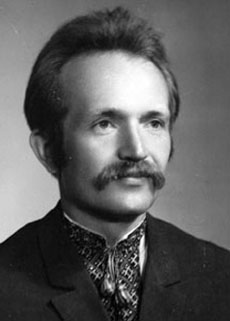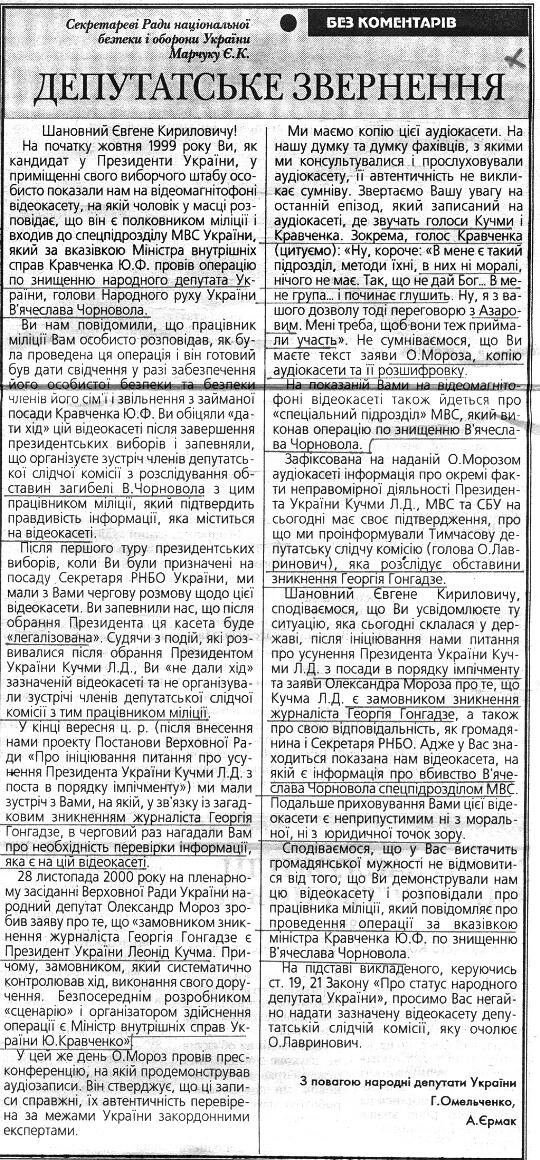04-Apr-1999
The Ukrainian Weekly
Rumors of conspiracy inflamed by lack of criminal investigation into fatal collision
by Roman WORONOWYCZ
Kyiv Press Bureau
KYIV — Even before the world and much of Ukraine had heard that Vyacheslav
Chornovil had died in a car accident shortly before midnight on March 25,
rumors were spreading like wildfire through the capital city that the fatal
collision was not an accident, but a planned execution of the political
leader by political opponents who had decided that the timing was right.
With the political party that Mr. Chornovil led in the throes of a deeply
emotional split and with presidential elections approaching in October,
the conspiracy theorists that quickly came out of the Kyivan woodwork surmised
that those who wanted to be rid of Mr. Chornovil, a person despised by as
many as adored him, could be safely removed before he played a defining
role in the elections.
The rumors were flamed further by the government's quick announcement
that the investigation into the Chornovil death would be limited to that
accorded a fatal auto accident.
The day after Mr. Chornovil's tragic death, Minister of Internal Affairs
Yurii Kravchenko, in an appearance on Ukrainian Television, explained that
the possibility of a murder conspiracy "is not and will not be investigated
under the circumstances." He explained that the incident was an unfortunate
accident, and that the driver of the diesel truck and trailer was a stable
family man with a wife, a 10-year-old son and a 15-year-old daughter, who
had lived in the same Dnipropetrovsk village of Oleksandropil for 12 years;
a person who was not a hired assassin.
Although Mr. Kravchenko's ministry, which The Weekly contacted to get
details of the collision, refused to comment until after its investigation
is complete, much of what happened that night can be pieced together from
various press accounts and interviews with people who were on the scene
after the collision.
On the night of March 25, Mr. Chornovil was returning to Kyiv after a
day spent politicking in Kirovohrad with National Deputy Hennadii Udovenko,
Rukh's presidential candidate. The two politicians were returning together,
but traveling in separate vehicles. The car in which Mr. Chornovil was a
passenger, along with his press secretary, Dmytro Ponomarchuk, in all likelihood
was traveling at between 140 and 150 kilometers per hour as it approached
a KamAZ diesel truck hauling two trailers filled with a total of 11 tons
of grain seed headed for the Volyn Oblast.
The KamAZ driver had missed his turnoff on the two-lane Boryspil-Zolotonosha
highway near the village of Horodysche in Boryspil county, just outside
of Kyiv, and the truck was perpendicular to the road as it made a slow U-turn
on the dimly lit road.
The driver of Mr. Chornovil's Toyota, Yevhen Pavliv, hit his brakes about
39 meters from the truck, as evidenced by the skid marks. The car's anti-skid
system did not allow the car to turn sideways, as could have been expected,
and the vehicle hit the truck between the truck hitch and the front trailer
wheels. As the car slid under the truck its top was sheared off, instantly
killing Messrs. Pavliv and Chornovil.
Why Mr. Pavliv, a professional driver who had raced automobiles competitively,
did not risk an attempt to swerve off the road, even though a ravine adjoined
it, rather than hit the truck will probably never be known.
At the time of impact the Toyota had probably slowed to some 50 kilometers
per hour, according to an official of the Security Service of Ukraine who
wished to remain unidentified. He said that, had the car swerved into the
truck or had it hit one of the truck's wheels, the chance that anyone would
have died would have been greatly reduced as the Toyota's airbags would
have absorbed much of the impact.
And that, said the official, is the main problem with the murder conspiracy
theory: the certainty of death, given all the variables, would not be high
in this type of a situation.
But those close to Mr. Chornovil and others at the scene of the collision
soon after it occurred are questioning details that have led them to demand
that an investigation into a possible murder conspiracy must take place.
At a public meeting held at Baikove Cemetery before Mr. Chornovil's body
was interred, several members of Ukraine's Verkhovna Rada stated outrightly
that the late Rukh leader was murdered.
National Deputy Les Taniuk, a leader of the Rukh Party who remained with
Mr. Chornovil after the split, called the incident "a killing."
National Deputy Vitalii Zhuravskyi, leader of the Christian Democratic
Party, was even more explicit. "I do not believe the death of Vyacheslav
Chornovil was an accident. It was a fair warning to those who have not made
their choice on the eve of the election season."
Ilko Kucheriv, head of the sociological polling organization Democratic
Initiative and a close friend of Mr. Ponomarchuk, told The Weekly that too
many questions remain unanswered to limit the scope of the investigation.
"It looks very suspicious, and the investigation should include the
possibility of an organized murder," he said.
He explained that he was present at the scene of the crime not long after
the collision, where he talked with Mr. Udovenko's body guard, who told
him that he never saw any headlights or running lights shining from the
KamAZ. According to Mr. Kucheriv, the body guard also stated that two other
men seem to have been with the driver, but soon afterwards they disappeared.
Time will tell whether such questions will be answered, but some believe
a criminal investigation is unlikely.
"If the government refuses to consider the possibility of murder,
then nothing will come of it," Serhii Naboka, a journalist and political
commentator, told The Weekly. "And, if the driver was in fact involved,
then he was paid off in such a way that he will never talk."
Mr. Naboka said that in his opinion most of the evidence is merely circumstantial
or downright conjecture, but he agreed that certain inconsistencies in the
facts as they have been reported leave room for questions.
Mr. Naboka also explained that sufficient precedent exists to believe
the "wild speculation" that to an extent surrounds the Chornovil
death and that it can be found in the way the Soviet KGB operated historically.
The KGB was the secret service arm of the Soviet government that was well-known
for its creative and ruthless suppression of political critics and opponents
of the Soviet regime.
Mr. Naboka said the manner in which Mr. Chornovil died was similar to
one method that Soviet leaders used to rid themselves of political opponents
and potential adversaries. Trucks were used in the murder deaths of at least
one early Soviet revolutionary, who was known as Kamo. He died after he
fell into disfavor with Stalin, when a truck ran into the bicycle on which
he was riding.
Then, in 1980, the head of the Belarusian Communist Party, Petro Masherov,
who had become popular among the Belarusian people for advocating an early
form of glasnost, died under questionable circumstances when his Chaika
automobile ran into a truck carrying tons of potatoes.
Mr. Naboka emphasized, however, that those incidents and others are not
proof that what happened to Mr. Chornovil was no accident. "All that
can be built is a chain of similarity," said the political commentator.
Mr. Naboka said the field of those who could be responsible is wide open
because there were many who might find political expedience in the death
of the vocal and uncompromising Mr. Chornovil.
Although many have woven a complicated web of conspiracy, few, if any
are ready to publicly come forward and say who they suspect might be responsible
for Mr. Chornovil's death. Mr. Naboka said he has heard accusations aimed
at everybody — from the Communist Party leadership and the current Ukrainian
state leadership to those on the far right who often had been at odds with
the late Rukh Party leader and the splinter Rukh Party that broke with Mr.
Chornovil weeks before his death.
But, as Mr. Naboka underscored, "there is no evidence," only
the theories, rumors and wild speculations of people trying to find the
answer to why the political force that was Mr. Chornovil died so suddenly
and so tragically.
Copyright © The Ukrainian Weekly, April
4, 1999, No. 14, Vol. LXVII
www.ukrweekly.com/Archive/1999/149908.html
|

